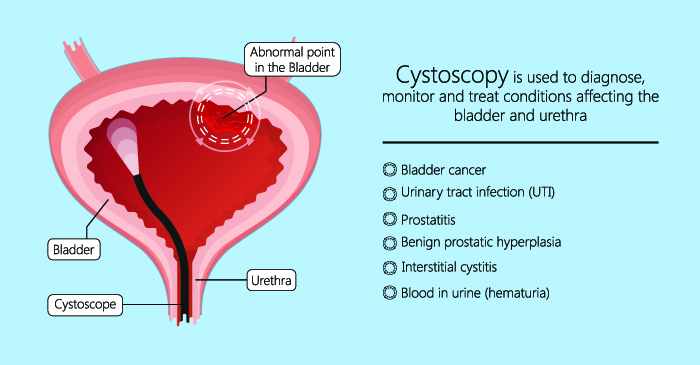Cystoscopy Surgery in Kondapur, Hyderabad
Cystoscopy is a procedure done to see the inside of the urinary organs. It helps in the diagnosis and treatment of diseases related to your urinary system.
What Is A Cystoscopy?
Cystoscopy is a diagnostic procedure done for the diagnosis and treatment of diseases of the urinary tract system. It is done by a urologist with an instrument called a cystoscope. The instrument is fitted with a small lighted tube and a camera that helps to see the urinary organs.

When Cystoscopy Is Done?
Cystoscopy is ordered for the diagnosis of several health problems related to the urinary system. It is done in the following cases:
- It is done if a person suffers from bladder problems such as unable to empty the bladder or unable to control the flow of urine
- Stones in the urinary tract
- Passing blood while urinating
- Recurrent urinary tract infection
- Pain while passing urine
A cystoscope is also used for treating various conditions such as:
- Taking urine samples from ureters
- Injecting a dye to track urine flow during an X-ray
- Injecting medicine for treating urinary problems
- Removing a stent placed for treating the earlier problem in the urinary tract
- Removing stones and small outgrowths from the urinary tract
- Taking a sample of small tissue for further diagnostic procedures
What Preparation Is Needed For A Cystoscopy?
Cystoscopy is mostly done in the outpatient unit but in some cases, the patient has to stay overnight.
In most cases, the doctor applies a gel to numb the area. But, if cystoscopy is done for a more invasive treatment, general anaesthesia may be given to the patient.
Your doctor will ask you to follow some instructions before the procedure, such as avoid eating or drinking several hours before the procedure. The preparation depends on the type and reason for your cystoscopy.
What Is The Procedure Of Cystoscopy?
The procedure of cystoscopy at Apollo Kondapur only takes a few minutes if it is done for diagnostic purposes. But, if it is done for some treatment purposes it may take longer. Your doctor will do it in the following way:
- He will insert an instrument called a cystoscope through the urinary opening
- Sterile salt water is injected into the urinary bag through the instrument
- It becomes easy to see the urinary bag lining properly when it is stretched. The doctor sees the inside of your urinary organs
- The doctor may insert small tools for removing small tissue samples if required for further diagnostic tests
- Finally, the doctor will ask you to empty your bladder
When Should I Contact The Physician?
You may experience pain while passing urine and blood in the urine for two days. You should contact the physician if you experience the following symptoms for more than two days:
- Severe pain when passing urine
- Passing a large amount of blood while passing urine
- Pain the bladder and sensation of fullness of the bladder
- Fever
- Foul smell in the urine
- Burning when passing urine
Request an appointment at Apollo Spectra Hospitals, Kondapur
Call 1860-500-2244 to book an appointment
What Are The Risks Associated With Cystoscopy?
You may feel burning when passing urine for two or three days after the procedure. You may have to pass urine more frequently. A small amount of bleeding occurs commonly for one or two days. Some risks associated with cystoscopy are:
- Swelling of the urethra makes it difficult to pass urine
- Infection of the urinary organs produces fever, pain in the lower back, and a bad smell in the urine
- Some amount of bleeding is normal for a day or two but if you experience excessive bleeding, you should consult with your health care provider.
Cystoscopy is a test performed that helps to diagnose and treat issues related to the urethra and bladder. It is a safe and quick procedure and takes only a few minutes.
If the procedure is done under general anaesthesia, it is not painful. You may have some discomfort when the tube is inserted. You may feel little pain if the procedure is done under local anaesthesia.
If the procedure is done as a diagnostic test under local anaesthesia you do not have to get admitted but if it is done for treatment purposes and general anaesthesia is required, you may have to stay in the hospital overnight.
You may have to take a rest for a few hours. If you have been given general anaesthesia and you have to bring a family member to drive you back home.
Symptoms
Our Top Specialities
NOTICE BOARD
CONTACT US
CONTACT US
 Book Appointment
Book Appointment


.svg)
.svg)
.svg)
.svg)








